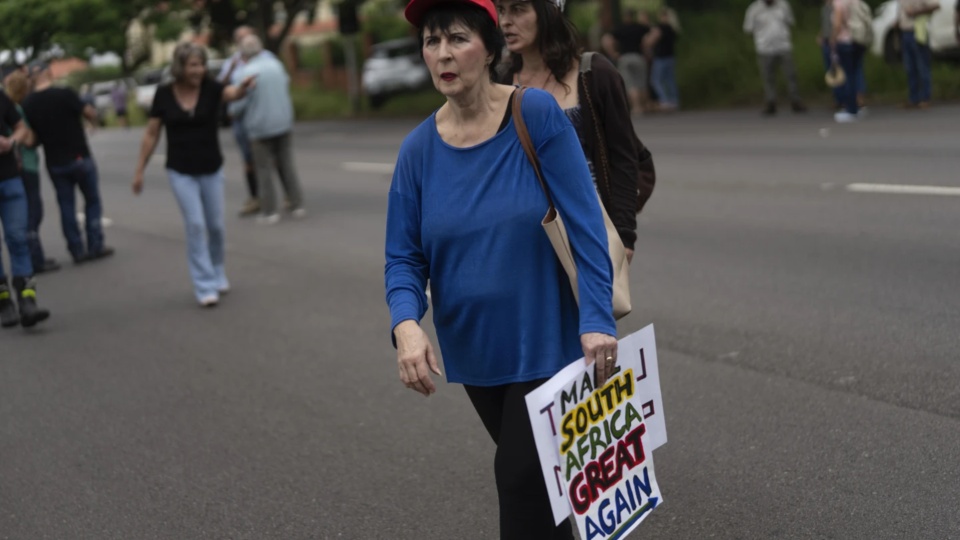
White South Africans demonstrate in support of President Donald Trump in front of the U.S. embassy in Pretoria, South Africa, Feb. 15, 2025. Some carried signs saying ‘Make South Africa Great Again,’ recalling the old days of the racist apartheid regime. | Jerome Delay / AP
As the dog returneth to his vomit, so the fool returns to his folly. (Proverbs, 26:11)
President Trump and his gang just have to keep repeating their thoroughly discredited claims that the South African government is committing acts of genocide against Afrikaans-speaking white farmers, and discriminating against white South Africans in general.
Two things are happening here in the United States that are evidence of the Trump crowd’s obsession with South Africa.
First of all, the U.S. Senate is finally getting around to holding hearings to approve Trump’s appointment of a new U.S. ambassador to South Africa. The choice is Mr. Leo Brent Bozell III, founder of the Media Research Center, an ultra-right organization which focuses on criticizing the establishment media as too far left or “woke.”
Predictably, the Republicans in the hearings praised Bozell to the skies, basically as the person who can determine whether the Republic of South Africa should be considered a U.S. “adversary” for its supposed persecution of whites and its having taken Israel to the International Criminal Court because of the Gaza genocide.
Secondly, Trump just announced that only 7,500 refugees will be allowed to come to the United States in the fiscal year which started in October, in contrast to the 125,000 let in during the last fiscal year. Moreover, the administration has made it clear that the vast majority of these new “refugees” will be white South Africans, with perhaps some Europeans who claim to be persecuted on account of their right-wing politics.
This is in a world context wherein there are multiple refugee-generating conflicts affecting African, Asian, and Latin American populations, including, most recently, horrific massacres in the civil war in Sudan.
The right-wing white leaders in South Africa are, of course, praising this decision to the skies. But the South African government, and recently a group of Afrikaans-speaking white South African leaders, have denounced it.
Right-wing South African organizations have nothing new to suggest; they generally want to return to a presumably idyllic past in which the Black person remained “op sy plek” (“in his/her place”). But that past was far from idyllic. In fact, labor relations on white-owned farms were often nothing short of Medieval.
This year, a court in Polokwane, in South Africa’s Limpopo Province, has been hearing the case of a white farm owner, Zachariah Johannes Olivier, and two of his employees, Adrian DeWet and William Musora, who are accused of murdering two Black women and feeding their bodies to the pigs.
The women, Maria Makgato and Lucia Ndlovu, supposedly trespassed on the Olivier farm to search for some food, evidently that had been left out for the pigs, so Olivier shot them and threw their bodies to the pigs in the hopes that the animals would dispose of the bodies completely. But this did not happen, and the threesome were caught by the police and put on trial.
DeWet has turned state’s evidence and will not be sentenced. It has been a very long, highly-publicized trial, and every adult South African knows that this is by no means the first time such a thing has happened.
In the 1980s, my late South Africa-born father and his wife took a trip to visit relatives there, and found that people were talking about a very similar case—a Black woman taking a shortcut through a white farmer’s land and being shot dead for it.
There is even a South African movie about a similar thing, called Place of Weeping, made in 1986 when the apartheid regime was still in power. There is much more. A court in Ladysmith, Kwazulu-Natal Province, has ruled that the 1967 death of Nobel Peace Prize winner and senior anti-apartheid campaigner Chief Albert Luthuli was not the result of an accident caused by a train, as reported by the government at the time, but rather an outright murder committed by apartheid government security forces abetted by railroad employees.
So, a whole series of terrorist acts by the apartheid regime are being re-examined. These include the murder of South African Communist Party leaders Chris Hani and Ruth First, of Black Consciousness activist Steve Biko, of white anti-apartheid activist Jeanette Schoon and her little daughter, political prisoner Ahmed Timol, the Cradock Four, and thousands more—literally thousands murdered by a regime for which right-wing politicians in South Africa and in the United States aided and abetted, and evidently still admire.
We hope you appreciated this article. At People’s World, we believe news and information should be free and accessible to all, but we need your help. Our journalism is free of corporate influence and paywalls because we are totally reader-supported. Only you, our readers and supporters, make this possible. If you enjoy reading People’s World and the stories we bring you, please support our work by donating or becoming a monthly sustainer today. Thank you!
CONTRIBUTOR
